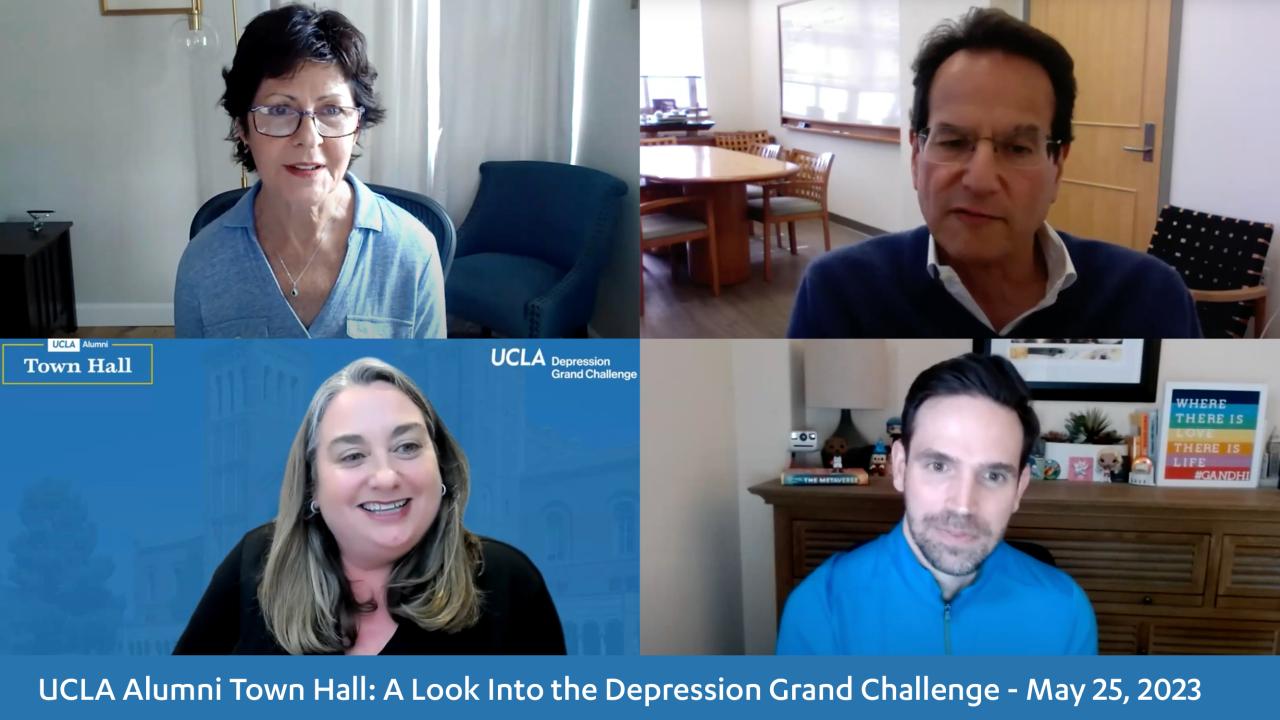
Depression is a growing global epidemic only accelerated by the pandemic, and even more reason why the world needs the concerted effort of the UCLA Depression Grand Challenge, said Director of the UCLA Depression Grand Challenge Dr. Nelson Freimer, addressing a group of UCLA alumni during Mental Health Awareness Month. “It [the DGC] is something we think of as a Manhattan project of mental health bringing the world together to solve this problem.”
Freimer added, “Depression is the main consequence of the pandemic today. We are still dealing with its aftermath in terms of increases in isolation, depression and anxiety. Almost all of us experienced some degree of depression during the pandemic and in its aftermath. The effect has been particularly great among young people, among members of marginalized communities. There’s some evidence that COVID-19 itself may have contributed to an increase in depression, further illustrating why we need to understand much more about the mechanisms of depression.”
The UCLA Alumni Association spotlighted the Depression Grand Challenge at its May Town Hall providing a strategic focus overview and update of the campuswide initiative and insights from the program to the alumni community.
Co-Director Michelle Craske, PhD, and Executive Director Michelle Popowitz ’91, JD, MPH ’94, joined Freimer on the featured panel, moderated by alumnus Devon Dickau ’07, MBA ’15. Together, the panelists explained the grand challenge premise, how it is different from other university research initiatives as well as its innovative playbook for how it plans to cut the global burden of depression on human health in half by 2050.
Freimer further set the stage for why UCLA has prioritized depression, and UCLA’s leadership position in its solutions. “The university recognized depression is the health problem of the 21st century. This is a credit to the leadership of UCLA, that in 2015 the Chancellor [Block] launched the Depression Grand Challenge based on the idea that UCLA as a major research university could do something unique to reach a goal to try to rid the world of the burden that depression places on health and well-being.”
The panel also shared the irrefutable evidence of the rising global rates of depression, and the disease’s catastrophic societal impact from families to the workforce and to entire communities, which will affect one in five people in their lifetime and takes approximately 3,000 lives by suicide every day around the world.
The Depression Grand Challenge has a specific and ambitious goal focused on large-scale research across disciplines into the causes and mechanisms of depression to create new treatments, with a second focus in tandem to provide access to effective and new approaches to treatment to everyone as they are available.
“The traditional approach to research is to work quite independently on research, publish the findings and rely on others — whether that’s commercial entities or policymakers — to take and apply the academic discoveries and insights. We aim to do the research and to continue our involvement until we identify its place or application in the world.” — Michelle Popowitz
In addition to the hurdle that current treatments are only effective 50% of the time, of those who suffer from depression, only 50% have access to treatments.
“There is an enormous need to provide resources to people, and the need is growing, and the existing resources are based on a fairly traditional one-to-one see a clinician model, which works well in many ways, but has a limit on how much it can reach the population at large. The resources are not meeting the need,” said Craske.
In 2017, UCLA began testing an innovative digital model of gold-standard care for the 18–24-year-old age group, which is primarily the age of college students, that would be scalable to screen and care for large numbers of people with depression and anxiety, Craske explained.
That program, the Depression Grand Challenge STAND system of care, pioneered and overseen by Craske, is in service today for students at UCLA and at East Los Angeles Community College in collaboration with the Los Angeles County Department of Mental Health. The STAND program is continually being enhanced and adapted to meet community needs. Craske also shared how UCLA collaborated during the pandemic with Beyoncé’s BeyGOOD initiative and Jack Dorsey, to initially distribute abbreviated STAND content as the COVID-19 Care package, and thereafter publicly available as a web-based version of STAND, called STAND for All.
Popowitz added how UCLA’s collaborative approach with industry experts, other universities, philanthropists and government entities is groundbreaking and catapulting its efforts through to solving the disease.
“In terms of research, universities are places for discovery and creating new understanding. While our goal has discovery and understanding at its core, we have committed to move beyond this discovery and translate those discoveries into impact.
“The traditional approach to research is to work quite independently on research, publish the findings and rely on others — whether that’s commercial entities or policymakers — to take and apply the academic discoveries and insights. We aim to do the research and to continue our involvement until we identify its place or application in the world.”
The panel also acknowledged the instrumental support of many UCLA alumni in the effort including Cristin Dorgelo, Shari and Garen Staglin, Stewart Resnick, Bill and Judy Levin, Robina Riccitiello, Nancy Rubin, Rick Runkel as advisors and Sara Bareilles and Kevin Love as public champions.
The UCLA Alumni Town Hall Series is a gathering place for Bruins to have their voices heard, ask essential questions, and receive transparency and expertise. The May UCLA Alumni Town Hall featuring the UCLA Depression Grand Challenge is available on YouTube to view now.
